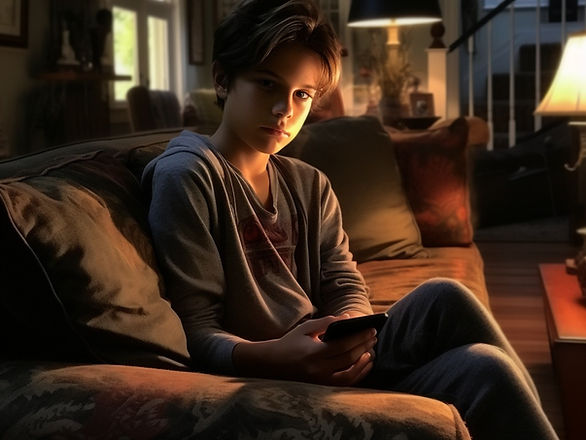I see you there, balancing your child’s playtime with their tablet time. I’ve been there too! Just yesterday, my little one was singing a tune from her favorite YouTube cartoon while trying to unlock my smartphone. It got me thinking, Are these little gadgets friends or foes when it comes to our child’s growth? Let’s talk about child development and technology’s impact.

This site contains affiliate links; please view the disclosure for more information.
Child Development and Technology’s Impact
Once Upon a Time in Gadget Land…
Back in the day, ‘technology’ meant a shiny new bicycle or a jump rope. Fast-forward to today, and the gadgets around our children are far from simple. We have tablets, smartphones, smart TVs, and even talking refrigerators! (Yep, I still can’t get over my fridge asking if I want more milk. I thought it was the toddler’s job to tell me that!)
Now, don’t get me wrong, technology is super cool. And many a time, it’s our hero on rainy days or when we just need five minutes of peace. But how is it shaping our child’s brain and behavior?
While technology can facilitate sociability and interaction, it can also result in social isolation and cyberbullying. According to one study entitled, Effects of Excessive Screen Time on Child Development: An Updated Review and Strategies for Management, kids who spent more time on screens were more likely to have social and emotional problems such as anxiety and sadness.
The Double-Edged Sword – Pros and Cons of Tech in Kids’ Lives
Sure, we’ve all seen it—children as young as two swiping away on a tablet, preschoolers knowing how to call Grandma on a smartphone, and teenagers who can fix a computer glitch faster than you can say “helpdesk.” But like any double-edged sword, technology has its pros and cons when it comes to child development.
Pros of Tech Time: Child Development and Technology’s Impact
A World of Knowledge at Their Fingertips
Educational apps have opened doors to so many subjects—math, science, and even coding! With a click, your child can visit a virtual library or tour a museum halfway across the world. Technology can indeed fuel their passion for learning, creating lifelong learners who aren’t limited to classroom walls.
Tech-Savvy from the Get-Go
In this day and age, understanding the digital landscape is almost as essential as reading and writing. Learning how to navigate technology early on sets our kids up for a future where digital literacy is not just a skill but a necessity.
Keep the Family Close, Virtually
Remember when you used to send postcards from your summer trips? Now your child can video call their cousins, grandparents, or friends from anywhere, keeping those precious bonds strong. It’s like a warm hug, just over Wi-Fi!
Educational Apps
Let’s admit it, there are some terrific educational apps out there. They teach everything from ABCs to algebra.
Fine Motor Skills
Games that require dragging and dropping can help in developing those tiny finger muscles. So, the next time your child drags an animated fruit into a basket, think of it as virtual basketball practice.
Cons of Screen Scene: Child Development and Technology’s Impact
Too Much of a Good Thing Can Be Bad
You’ve heard it: Screen addiction is real. Overuse of gadgets can lead to sleep troubles and may result in your child preferring screens over outdoor play. This can be detrimental to their physical health—because let’s be real, tapping a screen doesn’t burn as many calories as a good game of tag.
“Click” Doesn’t Always Mean Safe
The internet is like an endless city. It has libraries, schools, and playgrounds, but it also has its dark alleys. Children can stumble upon content they are not prepared to process, like violent videos or cyberbullying, which can have long-lasting emotional effects.
Screen Blues
Increased screen time can lead to issues like anxiety and depression, not to mention affecting attention spans. We’re still learning how technology can affect mental health, but it’s something we definitely can’t ignore.
Too Much Screen Time
Overdose is never good. Too much screen time can lead to bad posture, weak eyesight, and even a dip in social skills.
Unfiltered Content
The internet is a vast place, and not all of it is child-friendly. Those parental controls are there for a reason.
FOMO (Fear of Missing Out)
Yes, kids experience it too. If they see their friends playing the latest game, they might want in, leading to some real-life tantrums.
The Good Side of Gadgets – Tech Tools That Help Our Kids Grow
Alright fellow mommas, we’ve chatted about the ins and outs of the tech world for our kiddos, but let’s not forget that there are some fantastic tech tools out there that can do wonders for our kids’ development. Let’s dive into some of the superstar tech options that can give our children a leg up!
1. Educational Apps
Think of them as your child’s digital textbooks, but way cooler. There’s an ocean of apps that cover every topic imaginable, from learning ABCs to understanding complex math problems. These apps offer our children a dynamic and engaging way to grasp new ideas, making learning more fun than we ever had it!
2. A Peek into Virtual Reality
If you’ve ever wanted to send your child on a trip to ancient Egypt or deep under the sea without leaving home, virtual reality is your golden ticket! This immersive experience can transport our youngsters to different worlds, making learning alive and vibrant. Remember when we just had pop-up books? Yep, times have changed.
3. The Wonderful World of Online Learning
Platforms like Khan Academy and Coursera are like having a digital tutor for your child. Whether they’re diving deeper into a subject they love or getting a little extra help in a challenging area, these platforms offer top-notch educational content. Plus, they’re a godsend for kids who might not have access to certain resources in their local schools.
4. Tech to the Rescue – Assistive Technology
For our children with special needs, technology can be a real game-changer. Devices that help with communication or software that reads out text can make learning and communication much more accessible. It’s like giving them a superpower they didn’t know they had!
5. Game On – The Right Way
Now, before you raise your eyebrows, hear me out. Gaming isn’t all bad! Sure, we need to watch out for too much screen time, but games can teach our kiddos valuable skills like problem-solving, teamwork, and strategic thinking. And hey, who doesn’t love a good game night, even if it’s digital?
Remember, dear mommas, it’s all about balance. Just as we balance our kiddos’ diet with veggies and the occasional treat, we need to balance their tech intake with both educational tools and good old-fashioned play outside.
Child Development and Technology’s Impact – By Age Groups
Navigating the intricate layers of childhood is already quite the journey, and introducing technology into the mix makes for an even more colorful adventure! As our kiddos transition from one phase to another, their relationship with technology evolves in fascinating ways. Let’s get into the nitty-gritty:
Babies (0-2 years): The world of cooing and crawling! Babies benefit most from physical and emotional connections. While a lullaby from a smartphone might seem soothing, the warmth of a parent’s voice singing does wonders for bonding and cognitive development.
Toddlers (2-4 years): Oh, the curiosity! Little explorers indeed. A game on a tablet can introduce them to numbers and letters, but it’s the real-world adventures, like counting the stairs or identifying colors in the garden, that solidify these concepts.
Preschoolers (4-6 years): This is when technology can start to complement their ever-growing knowledge bank. Interactive apps, that teach reading or basic math, can be beneficial. But remember, they’re also learning invaluable life skills on the playground!
Elementary Kids (6-10 years): School’s in session! They’re potentially using computers for homework and might be dabbling in fun educational games. It’s an excellent age to introduce responsible tech usage, setting the groundwork for the future.
Tweens (10-13 years): Ah, the rollercoaster of pre-teen years! Social media might enter their radar now. While they can use technology to express themselves and explore hobbies, it’s also the age to have open conversations about online safety.
Teens (13-15 years): As they dive deeper into the world of social media, they might also use technology for academic research, passion projects, or even online courses. It’s a crucial phase to emphasize digital literacy and remind them of the importance of face-to-face connections.
Older Teens (15-18 years): On the brink of adulthood, they may be gearing up for college or exploring career paths. Technology here is not just a tool but a window to global opportunities. This is also the age where they might need guidance on managing digital distractions, especially as they prepare for significant academic or life milestones.
In all these stages, there’s one consistent factor: balance. Just as each age group has its tech benefits, they also need their time away from screens to grow holistically. Whether it’s the wonder in a toddler’s eyes as they discover the world or a teen’s proud moment of finishing an online project, let’s ensure technology enhances their experiences, not overshadow them.

Social Media for Kiddos: The Good, The Bad, and the Selfies!
The whirlpool of social media and how it’s shaping our children’s lives. It’s like the see-saw at the playground; there’s an up and a down. Let’s unravel the threads and see how we can help our little ones strike a balance.
Beware the Online Bullies
Remember the big kid who would snatch toys in kindergarten? Well, in the digital era, there’s a new kind of bully: the cyberbully. This isn’t just about rude comments on a post; it’s about kids being targeted and teased online. Imagine their feelings getting bruised every time they tap on an app. It’s tough.
Too Much Screen, Not Enough Green
While our children might argue that they’re just catching up with friends, too much time online can actually make them feel more alone. If they’re spending more hours clicking and less time kicking a ball in the yard, we might have a problem. And yes, those midnight TikTok dances? They’re probably the reason our kiddos are snoozing in their cereal bowls during breakfast.
Stumbling on the Oopsie Content
The internet isn’t always rainbows and unicorns. Sometimes our curious kids might end up in the stormy part, where content isn’t age-appropriate. Just like we wouldn’t want them to wander into a scary movie, we need to make sure they’re in the right digital neighborhood.
But Hey, It’s Not All Glum!
On the brighter side, social media lets our kiddos connect, share, and shine. Remember when your little one shared that awesome science project video and got tons of applause emojis from Aunt Linda and Grandpa Joe? Moments like these can boost their confidence and spread joy.
Gear Up With the Safety Net
Like teaching them to tie their shoelaces or look both ways before crossing, let’s equip them for the online world. That means setting boundaries, having open chats about the online “wild west”, and maybe even becoming their first follower or friend online. It’s all about guiding them until they can navigate safely on their own.
Striking the Right Balance Between Technology and “The Outside World”
We all want the best for our little (and not-so-little) ones, so how do we harness the power of technology for good? Here’s the rundown:
Timing is Everything
The American Academy of Pediatrics recommends limiting screen time, especially for younger children. No more than one hour for kiddos between 2 to 5 years, and consistent boundaries for those aged 6 and up. Stick a timer if you have to, or even better, make a fun, visible “Screen Time Clock” so the whole family can track their tech time!
Be an Active Tech Parent
Instead of letting them passively scroll through videos, encourage them to create something. Whether it’s writing their own stories, making videos, or even designing a simple game, active involvement boosts their creativity and problem-solving skills.
Digital Literacy 101
Just like we teach them to look both ways before crossing the street, we need to guide them through the digital world. Teach them to identify sketchy content, protect personal information, and, most importantly, to be respectful online.
Exploring the Digital Playground
I bet you’ve seen it: that sparkle in your little one’s eyes when they score points in a game or find a new online storybook. It’s as if they’ve discovered a brand new playground – one that’s inside a screen!
But just like we’d want to know about the slides, swings, and sand in a real playground, we should also be aware of what’s happening in the digital one.
Safety First!
Always ensure the games and apps they’re using are age-appropriate. Read reviews from other parents, and maybe even play the game yourself first. (Come on, it’s fun! Who says slides are only for kids?)
Interaction Over Isolation
Technology should be an avenue for interaction, not isolation. Opt for games or apps that encourage teamwork or problem-solving. This way, siblings can bond over virtual puzzles instead of fighting over the remote.
Unplug to Reconnect
Ever had those days where everything seems to beep, buzz, and ring? Our children feel it too. That’s why it’s essential to have ‘unplug’ days. These are days where screens are a no-no, and the real world takes center stage.
Benefits of Unplugging
- Quality Time: Rediscover board games, puzzles, and storytelling. Remember ‘Monopoly’? It’s still as fun (and competitive) as ever.
- Nature Calls: No, not that kind! A walk in the park, a day at the beach, or just lying down and watching clouds can be incredibly refreshing.
- Boost Creativity: With no screens to guide them, children come up with the most imaginative games! Living room forts, pretend-play, and more.
It’s Not Just the Kids!
This might sting a bit, but hey, we’re in this together, right? Sometimes, it’s not just the kiddos who are glued to screens. Yes, I’m looking at you, mom, scrolling through Pinterest recipes!
Children learn by observing. If they see us spending too much time with our devices, they’ll think it’s the norm. So let’s set the right example. Maybe designate an hour in the evening where the whole family is gadget-free. Trust me, it can lead to some memorable moments (and a few hilarious ones).
Research on Child Development and Technology’s Impact
Recently, I stumbled upon a study that had me nodding my head and mumbling, “Oh, that makes sense!” It’s titled “Impacts of technology on children’s health” and was spearheaded by Raquel Cordeiro Ricci and a host of talented researchers. Let’s dive into the nitty-gritty, shall we?
What They Did
The team went on a digital scavenger hunt, searching for articles from 2015 to 2020 on how the internet influences our kids’ growth and development. The search was done in reputable databases like PubMed and BVS. They sifted through 554 articles (Whew! Talk about dedication!) and zeroed in on 8 that really offered some juicy insights.
The Good, The Bad, and The Ugly
Just like that mixed bag of Halloween candy, the internet has its treats and some less-than-stellar surprises. The majority of the studies leaned towards the “be cautious” end. They found that too much screen time, especially with games and TV, could be linked to learning challenges and mental health concerns. BUT (and here’s the silver lining) tech can also pave the way for some wonderful psychosocial development moments.
Mom’s Takeaway
Going tech-free isn’t really an option these days, especially since the world is becoming more and more digital. Yes, the internet has its pitfalls, but it also has its perks. The key? Staying involved and making sure our kiddos are using it in a balanced way. Teaming up with knowledgeable health pros can also give us the tools to guide our little netizens safely.
Final Thoughts on Child Development and Technology’s Impact
Child development and technology’s impact is a vast ocean, and we’ve just skimmed the surface. As technology evolves, so will its role in our children’s lives. As parents, it’s our duty to steer them right. Be involved, be informed, and remember, every gadget has an ‘off’ button.



